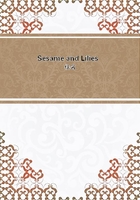
第45章
But mind, I do not mean to say that, in past or present relations between Ireland and England, you have been wrong, and we right. Far from that, I believe that in all great questions of principle, and in all details of administration of law, you have been usually right, and we wrong; sometimes in misunderstanding you, sometimes in resolute iniquity to you. Nevertheless, in all disputes between states, though the stronger is nearly always mainly in the wrong, the weaker is often so in a minor degree; and I think we sometimes admit the possibility of our being in error, and you never do.
And now, returning to the broader question, what these arts and labours of life have to teach us of its mystery, this is the first of their lessons--that the more beautiful the art, the more it is essentially the work of people who FEEL THEMSELVES WRONG;--who are striving for the fulfilment of a law, and the grasp of a loveliness, which they have not yet attained, which they feel even farther and farther from attaining the more they strive for it. And yet, in still deeper sense, it is the work of people who know also that they are right. The very sense of inevitable error from their purpose marks the perfectness of that purpose, and the continued sense of failure arises from the continued opening of the eyes more clearly to all the sacredest laws of truth.
This is one lesson. The second is a very plain, and greatly precious one: namely--that whenever the arts and labours of life are fulfilled in this spirit of striving against misrule, and doing whatever we have to do, honourably and perfectly, they invariably bring happiness, as much as seems possible to the nature of man. In all other paths by which that happiness is pursued there is disappointment, or destruction: for ambition and for passion there is no rest--no fruition; the fairest pleasures of youth perish in a darkness greater than their past light: and the loftiest and purest love too often does but inflame the cloud of life with endless fire of pain. But, ascending from lowest to highest, through every scale of human industry, that industry worthily followed, gives peace.
Ask the labourer in the field, at the forge, or in the mine; ask the patient, delicate-fingered artisan, or the strong-armed, fiery-hearted worker in bronze, and in marble, and with the colours of light; and none of these, who are true workmen, will ever tell you, that they have found the law of heaven an unkind one--that in the sweat of their face they should eat bread, till they return to the ground; nor that they ever found it an unrewarded obedience, if, indeed, it was rendered faithfully to the command--"Whatsoever thy hand findeth to do--do it with thy might."These are the two great and constant lessons which our labourers teach us of the mystery of life. But there is another, and a sadder one, which they cannot teach us, which we must read on their tombstones.
"Do it with thy might." There have been myriads upon myriads of human creatures who have obeyed this law--who have put every breath and nerve of their being into its toil--who have devoted every hour, and exhausted every faculty--who have bequeathed their unaccomplished thoughts at death--who, being dead, have yet spoken, by majesty of memory, and strength of example. And, at last, what has all this "Might" of humanity accomplished, in six thousand years of labour and sorrow? What has it DONE? Take the three chief occupations and arts of men, one by one, and count their achievements. Begin with the first--the lord of them all--Agriculture. Six thousand years have passed since we were set to till the ground, from which we were taken. How much of it is tilled? How much of that which is, wisely or well? In the very centre and chief garden of Europe--where the two forms of parent Christianity have had their fortresses--where the noble Catholics of the Forest Cantons, and the noble Protestants of the Vaudois valleys, have maintained, for dateless ages, their faiths and liberties--there the unchecked Alpine rivers yet run wild in devastation; and the marshes, which a few hundred men could redeem with a year's labour, still blast their helpless inhabitants into fevered idiotism. That is so, in the centre of Europe! While, on the near coast of Africa, once the Garden of the Hesperides, an Arab woman, but a few sunsets since, ate her child, for famine. And, with all the treasures of the East at our feet, we, in our own dominion, could not find a few grains of rice, for a people that asked of us no more; but stood by, and saw five hundred thousand of them perish of hunger.
Then, after agriculture, the art of kings, take the next head of human arts--Weaving; the art of queens, honoured of all noble Heathen women, in the person of their virgin goddess--honoured of all Hebrew women, by the word of their wisest king--"She layeth her hands to the spindle, and her hands hold the distaff; she stretcheth out her hand to the poor. She is not afraid of the snow for her household, for all her household are clothed with scarlet. She maketh herself covering of tapestry; her clothing is silk and purple. She maketh fine linen, and selleth it, and delivereth girdles to the merchant." What have we done in all these thousands of years with this bright art of Greek maid and Christian matron?